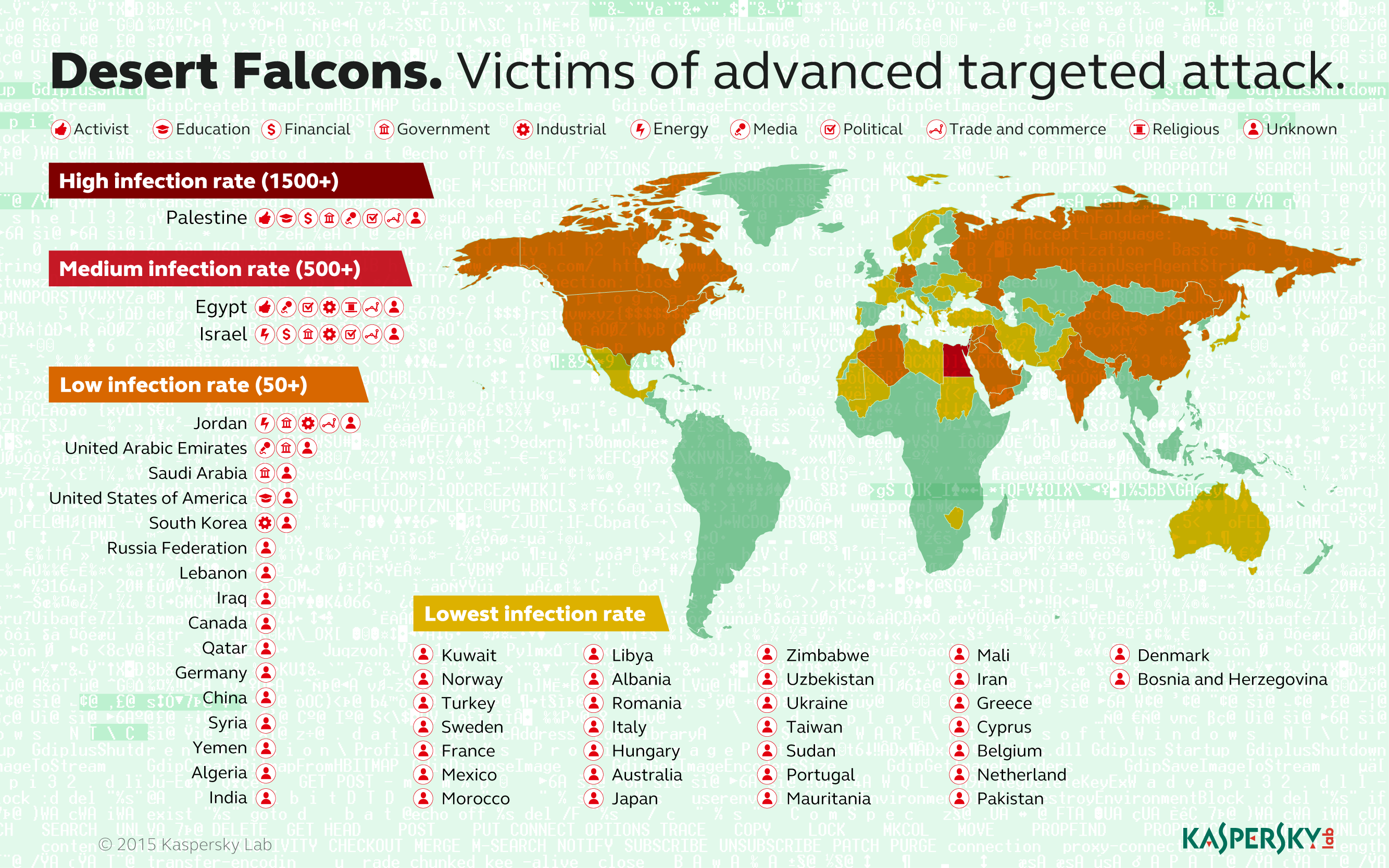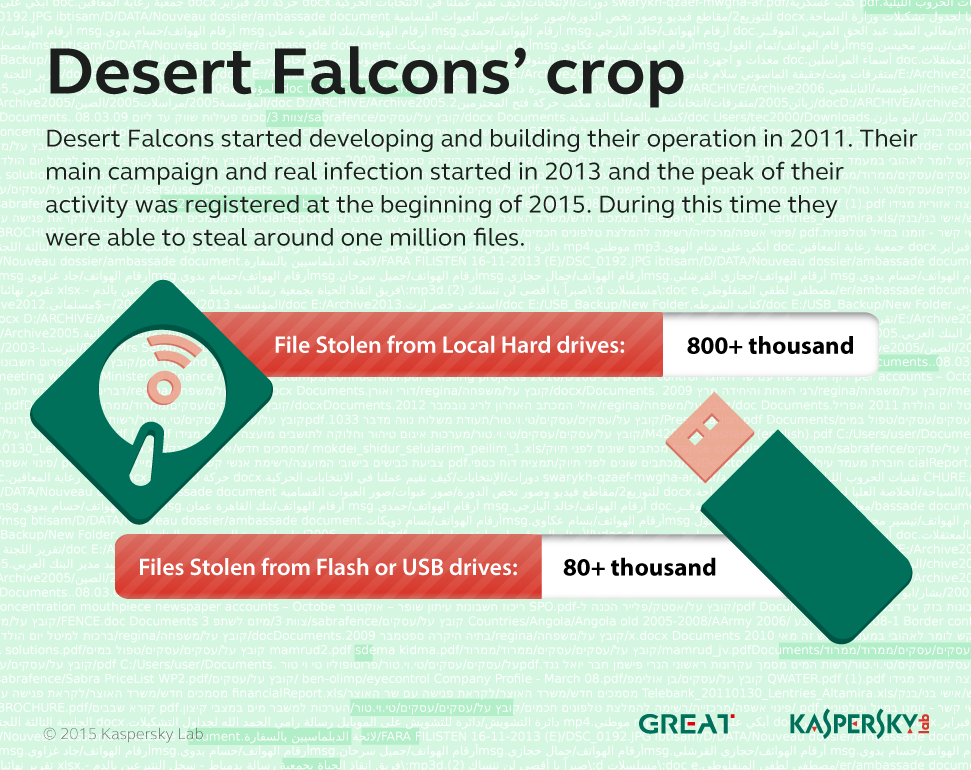How the first known Arabic cyber espionage group can steal your files
MANILA, Philippines - A cyber espionage group targeting multiple high profile organizations and individuals from Middle East countries has been discovered by Kaperksky Lab experts. This group of hackers is tagged as the Desert Falcons, the first known Arabic group of cyber mercenaries to develop and run full-scale cyber-espionage operations.
Things to know about the Desert Falcons
- The Desert Falcons started developing and building their operation in 2011, with their main campaign and real infection beginning in 2013. The peak of their activity was registered at the beginning of 2015
- The vast majority of targets are based in Egypt, Palestine, Israel and Jordan
- The attackers utilize proprietary malicious tools for attacks on Windows PCs and Android-based devices
- Kaspersky Lab experts have multiple reasons to believe that the attackers behind the Desert Falcons are native Arabic speakers
- The list of targeted victims include military and government organizations - particularly employees responsible for countering money laundering as well as health and the economy, leading media outlets, research and education institutions, energy and utilities providers, activists and political leaders, physical security companies, and other targets in possession of important geopolitical information.
The hackers’ victims in numbers
- In total, Kaspersky Lab experts were able to find signs of more than 3,000 victims in 50+ countries, with more than one million files stolen.
- Although the main focus of Desert Falcons’ activity appears to be in countries such as Egypt, Palestine, Israel and Jordan, multiple victims were also found in Qatar, KSA, UAE, Algeria, Lebanon, Norway, Turkey, Sweden, France, the United States, Russia and other countries.

How the Desert Falcons get into your system
Deliver
- The main method used by the Falcons to deliver the malicious payload is spear phishing via e-mails, social networking posts and chat messages.
- Phishing messages contained malicious files (or a link to malicious files) masquerading as legitimate documents or applications. Desert Falcons use several techniques to entice victims into running the malicious files.
Infect
- One of the most specific techniques is the so-called right-to-left extension override trick. This method takes advantage of a special character in Unicode to reverse the order of characters in a file name, hiding the dangerous file extension in the middle of the file name and placing a harmless-looking fake file extension near the end of the file name.
- Using this technique, malicious files (.exe, .scr) will look like a harmless document or pdf file and even careful users with good technical knowledge could be tricked into running these files. For example, a file ending with.fdp.scr would appear .rcs.pdf.
Spy
- After the successful infection of a victim, Desert Falcons would use one of two different Backdoors: the main Desert Falcons’ Trojan or the DHS Backdoor, which both appear to have been developed from scratch and are in continuous development.
- Kaspersky Lab experts were able to identify a total of more than 100 malware samples used by the group in their attacks.
- The malicious tools used have full Backdoor functionality, including the ability to take screenshots, log keystrokes, upload/download files, collect information about all Word and Excel files on a victim’s Hard Disk or connected USB devices, steal passwords stored in the system registry (Internet Explorer and live Messenger) and make audio recordings.
- Kaspersky Lab experts were also able to find traces of activity of a malware which appears to be an Android backdoor capable of stealing mobile calls and SMS logs.
- Using these tools the Desert Falcons launched and managed at least three different malicious campaigns targeting different set of victims in different countries.

A pack of Falcons on the hunt for secrets
It is estimated that at least 30 people, in three teams, spread across different countries, are operating the Desert Falcons malware campaigns.
“The individuals behind this threat actor are highly determined, active and with good technical, political and cultural insight. Using only phishing emails, social engineering and homemade tools and backdoors, the Desert Falcons were able to infect hundreds of sensitive and important victims in the Middle East region through their computer systems or mobile devices, and exfiltrate sensitive data,” said Dmitry Bestuzhev, security expert at Kaspersky Lab’s Global Research and Analysis Team.
“We expect this operation to carry on developing more Trojans and using more advanced techniques. With enough funding, they might be able to acquire or develop exploits that would increase the efficiency of their attacks,” Bestuzhev added.
Kaspersky Lab products successfully detect and block the malware used by Desert Falcons threat actors.



















